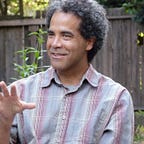Creation is Compassion
As of late because of the weather and time change, I’ve been indoors reading more about compassion. Today I finished a book entitled A Small Treatise on the Great Virtues by Andre Comte-Sponville, one of the virtues being compassion. What he believes to be the greatest virtue he saves for last–love. He distinguishes between the classical Greek concepts of eros, philia, and agape. I read the section on agape in relation to my own and others’ concepts on compassion. Over the course of the last few years, as my concept of compassion evolves, this morning it struck me that Creation itself is compassion–God’s way of recognizing the essense of herself.
Comte-Sponville asks “Why did God make the world?” He shares his ideas on how God renunciates her own existence in order that we can experience ourselves, which made me think of Karen Armstrong’s concept of compassion as “making room for the other,” whether it be ideologically, physically, or personal. God created space for us to be, recognizing the essence of herself in us and in all things (compassion) and lessening a portion of herself for our sake, while at the same time remaining omniscient by being in our hearts and at the heart of all. It is as though God says, “I am only everything as the essence of you and all things.” Compassion becomes necessary for God to experience herself, doing so through Creation.
Other well-known mystics/saints/sages share similar concepts. Ramana Maharshi, the enlightened Hindu saint, spent most of his life in silence after reaching Self-realization at the age of sixteen. He once told a disciple, “I am where there is no word.” The disciple replied, “Then why do you talk?” Maharshi answered, “Out of compassion.” Out of nothing comes something and for Maharshi coming out of his silence for others for the sake of deeper understanding is compassion. Jesus lived with the awareness of compassion toward others to the point of sacrificing his own life for the sake of Truth, living solely to heal others and bring Light to the world. All those who aspire to bring love to the forefront of thought and action, and in the end back to itself, do so in time and space–creatively, compassionately.
Which leads me back to what I believe to be the basic components of compassion–listening, acknowledging, mutual understanding, and action; you make space for yourself and others by remaining in an attentive quiet place, being still, making sure you and/or the other share that attentive space by acknowledging what is being said or what is happening. Then the mutual understanding takes place, the connection, that allows for an action to be taken to alleviate the suffering. That action then brings harmony back to the energy of love.
I wanted to share these thoughts with you this evening after the insight of Creation being God’s compassion. At its logical end compassion strives to love unconditionally, an idea borrowed from Leo Tolstoy’s treatise The Law of Love and the Law of Violence–we are here to love unconditionally, spontaneously, without the slightest exception. So love unconditionally! Be creative! Be compassionate!
Originally published at compassionis.com.
